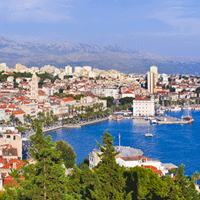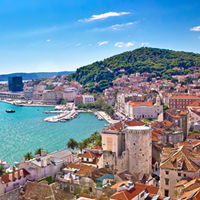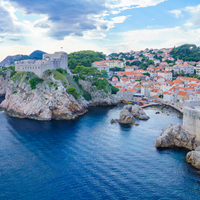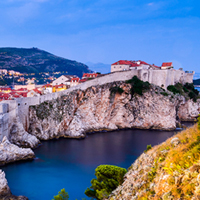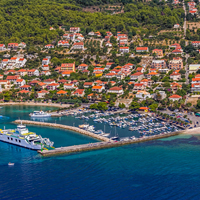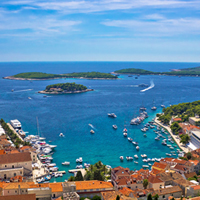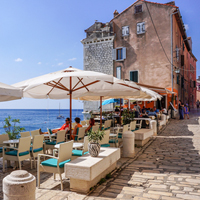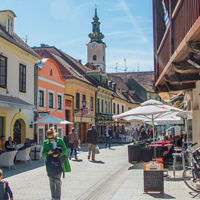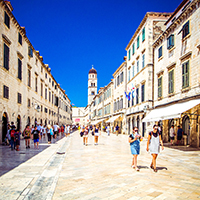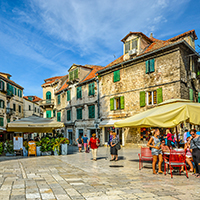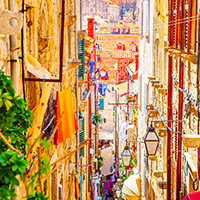Croatia
Coastal BeachesCroatia is a country situated at the crossroads of Central and Southeast Europe on the Adriatic Sea. Its capital and largest city, Zagreb, forms one of the country's primary subdivisions, along with twenty counties. Croatia has an area of 56,594 square kilometers and a diverse, mostly continental and Mediterranean climate. Croatia's Adriatic Sea coast contains more than a thousand islands. The country's population is approximately 4 million, most of whom are Croats, with the most common religious denomination being Roman Catholicism. Emerging as a sovereign state in 1991 after the breakup of Yugoslavia, Croatia is a republic governed under a parliamentary system. It is a member of the European Union, United Nations, the Council of Europe, NATO, the World Trade Organization, and a founding member of the Union for the Mediterranean. As an active participant in UN peacekeeping and a contributor to international military operations, Croatia has established itself as a stable international partner. Croatia boasts a rich cultural legacy that dates back to the early medieval period. Its history is marked by a series of foreign dominations, including those by the Hungarians, Ottomans, Venetians, and Austro-Hungarians. Today, Croatia is known for its historic architecture, natural beauty, and a vibrant tourist industry that is vital to its economy. The country's cultural heritage includes seven UNESCO World Heritage Sites, including the historic city of Dubrovnik, the Plitvice Lakes National Park, and the Cathedral of Saint James in Šibenik. The Croatian economy is classified as a high-income economy by the United Nations. Key sectors include tourism, which accounts for up to twenty percent of GDP, energy, services, and agriculture. The country is also known for its wine, olive oil, and culinary offerings, which reflect its diverse influences and regions. Croatia's Adriatic coast is a popular destination for tourists seeking its beautiful beaches, clear waters, and Mediterranean climate. The interior of the country, while less frequented by tourists, offers historic cities, rural landscapes, and natural parks for exploration. Croatia's natural environment varies from flat plains along the Hungarian border, dense woodland regions in Lika and Gorski Kotar, which are part of the Dinaric Alps, to the rocky coastlines of the Adriatic Sea. The country is also home to several mountain ranges, including the Velebit, Dinara, and the Risnjak, which offer opportunities for hiking, climbing, and winter sports. The Croatian coast is known for its mild winters and dry summers, while the interior experiences a more continental climate, with hot summers and cold, snowy winters. Croatia's cultural scene is vibrant, with numerous festivals, events, and traditions that reflect its rich history. The country is also known for its contributions to the arts, including literature, music, film, and the visual arts. Croatian cuisine is diverse, with regional specialties that offer a blend of flavors influenced by its varied history and geography. Overall, Croatia is a country of stunning natural beauty, a rich cultural tapestry, and a growing reputation as a must-visit destination in Europe.
 SJB Global
SJB GlobalConnect
SJB-Global is a top-rated financial advisory firm specializing in expat financial advice worldwide, offering retirement planning & tax-efficient solutions with a regressive fee model. Our clients benefit from their country’s most favorable tax environment by utilizing the efficient investment vehicles we offer. Our commitment to quality service is reflected in our stellar reviews, with over 300 testimonials boasting 95% five-star ratings.
Click connect to have our partner contact you via e-mail and/or phone.
 SJB Global
SJB GlobalSJB-Global is a top-rated financial advisory firm specializing in expat financial advice worldwide, offering retirement planning & tax-efficient solutions with a regressive fee model. Our clients benefit from their country’s most favorable tax environment by utilizing the efficient investment vehicles we offer. Our commitment to quality service is reflected in our stellar reviews, with over 300 testimonials boasting 95% five-star ratings.
Connect
Click connect to have our partner contact you via e-mail and/or phone.
Living in Croatia
Best Places to Live in Croatia
Visa & Residency
Obtaining a residency in Croatia involves several steps and can be considered an average challenge for expats. The process begins with determining the appropriate type of visa. The most common types are the Temporary Stay Visa and the Permanent Stay Visa. For temporary stays, expats must apply before entering Croatia at the nearest Croatian embassy or consulate. The application requires various documents, including a valid passport, proof of health insurance, evidence of sufficient funds to support the stay, and a purpose for the stay, such as work, study, or family reunification. For those interested in permanent residency, applicants must have held temporary residency for five years before applying. The Permanent Stay Visa requires additional documentation, such as proof of integration into the Croatian society, which may include language proficiency and social connections. Digital nomads can apply for the Temporary Stay Visa specifically designed for them. This visa was introduced to attract remote workers and is valid for up to one year. Applicants must provide proof of their status as digital nomads, which typically means showing they work remotely for a company or clients outside of Croatia. They must also have health insurance and show they have the financial means to support themselves without taking local employment. The difficulty of the process can vary based on the applicant's nationality, the completeness of their application, and their specific circumstances. It is advisable to start the application process well in advance of the intended move date, as processing times can vary. Additionally, laws and regulations may change, so staying informed about the latest requirements is crucial. Expats often benefit from consulting with legal experts or expatriates who have gone through the process. Overall, while there are several bureaucratic hurdles to clear, with proper preparation and documentation, obtaining a residency visa in Croatia is a manageable process for many expats.
Healthcare in Croatia
Croatia offers a mix of public and private healthcare services. The public healthcare system is funded by the Croatian health insurance Fund (HZZO), to which residents contribute through mandatory health insurance. Public healthcare is accessible to all legal residents, including expats who are employed or self-employed in Croatia and contribute to the system. The quality of public healthcare varies, with urban areas typically having better facilities and more specialists than rural areas. Private healthcare is also available and is often used by those seeking shorter wait times and more luxurious conditions. It is more expensive than public healthcare but still generally affordable compared to Western European standards. Expats and digital nomads can access public healthcare once they are registered and have started paying into the Croatian health insurance system. This usually requires having a residence permit and an OIB (personal identification number).
Cost of Living
The cost of living in Croatia is considered moderate when compared to other European countries. It offers a relatively affordable lifestyle, with lower costs for housing, food, and transportation than many Western European nations.
Weather
Croatia experiences a variety of climates. The interior of the country has a continental climate with hot summers and cold, snowy winters. The Adriatic coast enjoys a Mediterranean climate with mild, wet winters and hot, dry summers. The mountainous regions have an alpine climate, with cooler temperatures and higher precipitation.
Educational System in Croatia
The educational system in Croatia is structured and comprehensive, providing a range of options for families moving to the country. Education is mandatory for children between the ages of six and fifteen. The system is divided into several stages: preschool education, primary education, secondary education, and higher education. Preschool, while not mandatory, is available for children from six months to six years old. Primary education lasts for eight years, starting at the age of six and is divided into two four-year cycles. After completing primary school, students attend secondary education which lasts for three to five years, depending on the type of school. There are general and vocational secondary schools, including gymnasiums, art schools, and technical schools. The gymnasium provides a general education and prepares students for university, while vocational schools prepare students for specific professions, with the possibility of continuing to higher education. The school year in Croatia typically starts in early September and ends in June, with major holidays in between. Upon completion of secondary education, students take a state matriculation exam, which is necessary for university entrance. The Croatian educational system is known for its quality and adherence to European standards, ensuring a smooth transition for children from other educational systems.
Universities in Croatia
The university system in Croatia is part of the European Higher Education Area, following the Bologna Process, which standardizes university education across Europe. Universities in Croatia offer undergraduate, graduate, and postgraduate programs. An undergraduate degree (Bachelor's) typically takes three to four years to complete, a graduate degree (Master's) takes one to two years, and a postgraduate degree (Doctorate) can take up to three years or more. The academic year is divided into two semesters, with exams held at the end of each semester. Croatian universities offer a wide range of courses in various fields, and many programs are available in English, especially at the postgraduate level, to cater to international students. The country has both public and private universities, with the public ones being more prevalent and generally held in higher regard. Public universities tend to have lower tuition fees, especially for EU citizens, while private institutions may charge more. Living costs in Croatia are reasonable compared to other European countries, making it an attractive destination for foreign students. The country's universities are known for their history, some dating back to the 17th century, and for providing a high-quality education that is recognized across Europe and beyond.
Copyright 1997-2025 Burlingame Interactive, Inc.

